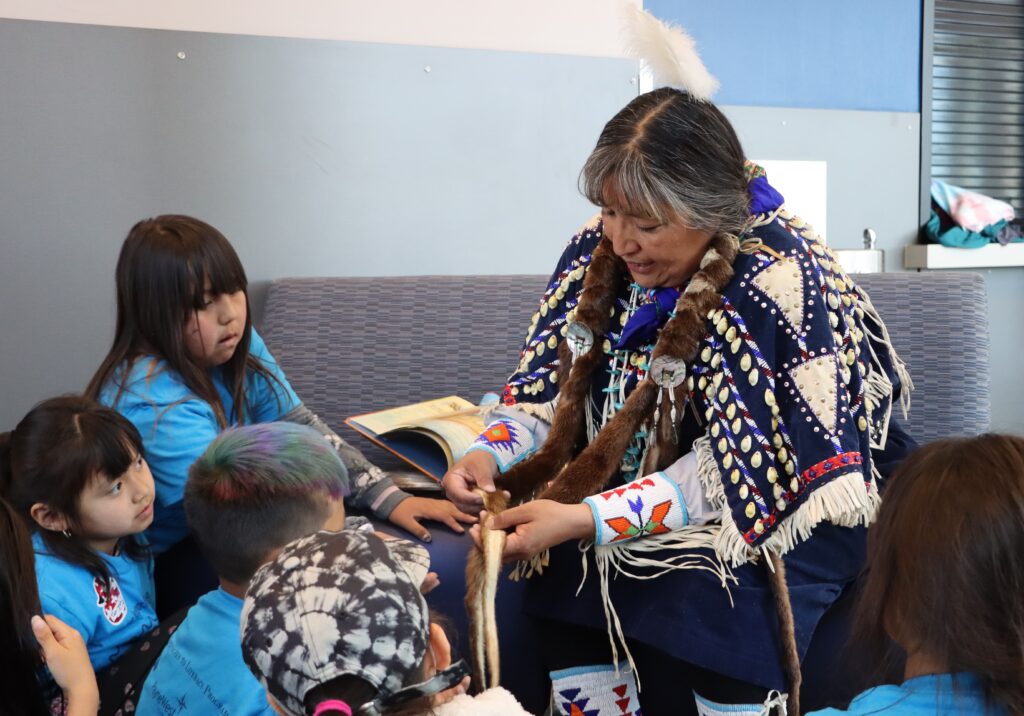
Jefferson County School Board member Laurie Danzuka explains her Tribal regalia to students during a May 2022 district literacy event. In her work for the High Desert Education Service District, Danzuka is helping schools implement Oregon’s Tribal history curriculum. (Photo courtesy of the Jefferson County School District)
The Oregon Legislature passed a law in 2017 requiring K-12 schools to teach Tribal history. The roll out, though, has been spotty, hindered by the pandemic as well as a need for training and support.
Jefferson County School Board member Laurie Danzuka is helping fill the gaps. Danzuka, a Confederated Tribes of Warm Springs member, works for the High Desert Education Service District as its Native American success coordinator.
Long an advocate for public and Tribal education, she provides training for administrators and educators and enrichment activities for classrooms. This year she will be working with recently enhanced and updated materials from the Warm Springs Tribes.
“They are trying to weave it into the entire year, not just have history once a year,” she said.
Senate Bill 13 (2017), known as Tribal History/Shared History, required the Oregon Department of Education to create a K-12 Native American curriculum, and it provided grants for Oregon’s nine federally recognized Tribes to create additional place-based and Tribe-specific lessons. The state expects schools to teach at least five lessons per year in grades four, eight and 10, with at least one in the areas of English language arts, health, math, science and social science. ODE’s Office of Indian Education, working with Tribes and educators, has created lessons and online professional development for those grades and has recently added fifth-grade lessons to continue expanding the expectations.
The lessons include history from a Tribal perspective, but also incorporate Native American elements into other disciplines. For instance, in eighth-grade math, a Native American plank house is used to teach the Pythagorean theorem.
ODE began implementing the curriculum in 2019, but a study released in spring 2022 showed the lessons are not in widespread use. Teachers said a lack of support or training is a major factor, according to the report.
That’s one of the holes Danzuka fills.
Danzuka worked closely with her own district and her Tribal government to create lessons and training materials for educators. In her ESD role, she offers an overview of Tribal history for educators and administrators and suggestions on how to implement lessons. This summer she did a three-day workshop for Jefferson County teachers on the curriculum.
Melinda Boyle, Jefferson County director of curriculum and instruction, said educators are eager for the guidance. Boyle said her district, which is about one-third Native American students, started incorporating Tribal history into their curriculum with the help of Danzuka and the Warm Springs Tribes before the law was even passed.
She said a partnership with the local Tribes has created a richer experience for the children. Each of the three Tribes of the Warm Springs — the Paiute, Wasco and Warm Springs — created individual lessons related to their heritages, languages and traditions.
Boyle said the Warm Springs lessons are available to other districts, and she is excited to see the growing number of lessons on the ODE website from Tribes.
Danzuka also goes into classrooms for enrichment activities. She tells stories and shares Tribal artifacts such as clothing and tools. Danzuka loves the curiosity of children and the chance to dispel misinformation. Some of the history lessons of brutality against Tribes can be hard, but she said she finds great empathy in children and a desire for a better future.
Danzuka mostly works in her ESD area, but she has helped other districts that have reached out to her.
“We haven’t told anyone no,” Danzuka said.
She said many people who are not Native American are afraid to teach Tribal history, worried they will make a mistake or offend someone. Danzuka tells them that teaching Tribal history is no different than teaching other history lessons.
Danzuka, the 2021 Oregon School Board Member of the Year, works hard to connect her community and her district’s schools. She said her school board advocacy led to her present role.
Danzuka hopes more school board members will advocate for increased Tribal history teaching. She encouraged school leaders to reach out to local Tribal partners. Implementing the Tribal History/Shared History curriculum has been harder than some expected, she said, but it’s important to remind people of Tribes’ ongoing vital contribution to Oregon.
“Natives are always spoken of in the past tense, and we’re here and we’re present now,” she said. “It’s really important for people to understand we haven’t gone anywhere.”
– Jake Arnold, OSBA
[email protected]